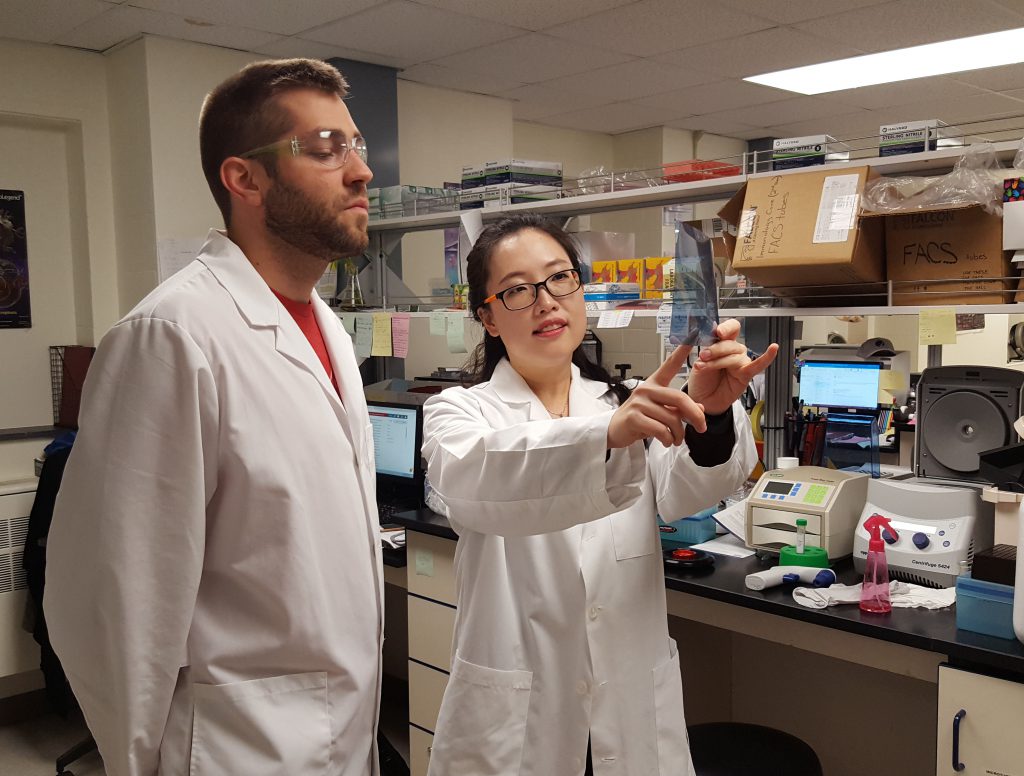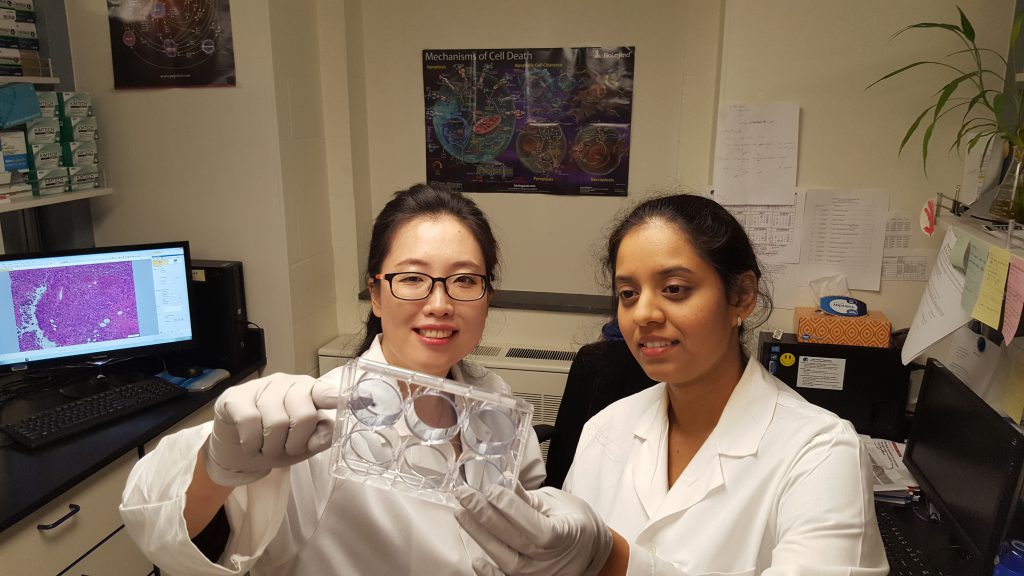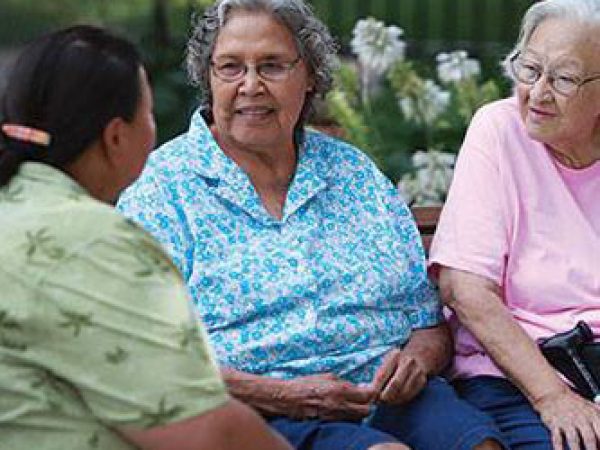Examining the Tumor Microenvironment and Metabolism in Ovarian Cancer
Dong-Joo (Ellen) Cheon, PhD, Assistant Professor of Regenerative and Cancer Cell Biology at Albany Medical College and the 2017 AACR Gertrude B. Elion Cancer Research Award grantee, has been working in the field of ovarian cancer her entire career.
She was first introduced to ovarian cancer research as a graduate student at The University of Texas Health Science Center at Houston when she was tasked with generating CA125 knockout mice. CA125, or cancer antigen 125, is a blood serum biomarker routinely used to diagnose and monitor ovarian cancer. “I discovered that CA125, which is encoded by the MUC16 gene, is not essential for ordinary development and reproduction,” Cheon explains, “but important for ovarian cancer progression.” As Cheon delved more deeply into the study of ovarian cancer, she recalls, “I was shocked to learn that survival outcome has not been significantly improved over the last 40 years.”

Dong-Joo (Ellen) Cheon’s research is centered on the tumor microenvironment of ovarian cancer. She received the 2017 AACR Gertrude B. Elion Cancer Research Award. Photos provided by Cheon.
Indeed, of the five main types of gynecologic cancer (cervical, ovarian, uterine, vaginal, and vulvar), ovarian cancer is the most lethal, with a five-year survival rate of 47.4 percent, and is the fifth leading cause of cancer-related death among women. Cheon also learned of the difficulties associated with ovarian cancer treatment, such as a lack of early-detection biomarkers, the rapid development of chemoresistance in ovarian tumors, and a paucity of effective therapeutic options for cisplatin-resistant recurrent tumors. Moreover, ovarian cancer research itself poses many challenges due to the cancer’s complex heterogeneity and genomic instability, as well as a lack of scientific consensus regarding its cell of origin. Precisely because of these many challenges, Cheon decided to devote her career to understanding the disease.
Cheon’s work has focused on how tumor cells interact with different types of collagens in the tumor microenvironment during cancer progression and the development of chemoresistance. Collagen, the most abundant protein in mammals, is the main structural and tensile protein in the extracellular space in connective tissues. According to Cheon, several types of collagen are not only overexpressed in ovarian cancer, their composition and architecture are altered to promote tumor progression. “When cancer cells sense a stiffer extracellular matrix through their cell surface receptors,” Cheon explains, “they activate survival signaling to develop resistance to chemotherapy.” In addition, Cheon notes that cancer cells use linear collagen fibers as highways to migrate out to distant organs.
“It is important to determine the unique role of each individual collagen in cancer,” Cheon advises, “since the distribution and composition of collagen types changes during tumor progression.” Through her research, she has discovered 10 collagen crosslinking genes whose overexpression is strongly associated with poor survival, chemotherapy resistance, and tumor recurrence in ovarian cancer. One of those genes, COL11A1, is particularly highly-upregulated during ovarian cancer progression.
“Initially we were studying the mechanisms by which COL11A1 directly confers resistance to cisplatin in ovarian cancer cells,” Cheon recalls. However, she found that COL11A1 does not modify the expression of genes involved in cisplatin uptake, efflux, inactivation, or DNA repair, the mechanisms known to be involved in the development of cisplatin resistance.

Cheon’s current work examines how FAO enzymes could potentially be targeted to overcome ovarian cancer cells’ resistance to cisplatin.
“Interestingly,” says Cheon, “our proteomics data show that fatty acid beta-oxidation (FAO), the major metabolic pathway that breaks down fatty acids for producing cellular energy, is the most upregulated pathway in COL11A1-overexpressing, cisplatin-resistant ovarian cancer cells.” It turns out that COL11A1 increases the expression of key FAO enzymes.
Cheon’s current work, funded through her AACR Gertrude B. Elion Cancer Research Award, builds on this discovery by examining how targeting FAO can sensitize cancer cells to cisplatin. Her novel hypothesis may have important implications for ovarian cancer treatment.
“FAO is relatively poorly studied,” she notes, “and at this point we still don’t know how FAO is induced and how it confers resistance.” However, Cheon’s research may hold the key to unlocking this knowledge, which could yield novel therapeutic strategies to block resistance. “Since ovarian cancer cells frequently disseminate to the fat-rich omentum and use fat for energy,” she explains, “blocking FAO might serve as a promising strategy to overcome cisplatin resistance.” She adds that this work could also inform more standard approaches to studying any type of cancer, which more often examine the role of various genes and oncogenes in metabolism, and further expand our understanding of how the tumor microenvironment can reprogram tumor cell metabolism.
Cheon is grateful for the support provided by the AACR for this exciting project. “The AACR Gertrude B. Elion Cancer Research Award is the first grant I was awarded as a junior faculty member,” she notes, “and I can testify that it has positively impacted both my career development and research.” Indeed, the grant has already enabled her to begin producing novel results that lay the foundation for future studies and grant applications, which will enable her to establish a position as a leader in the field.
Since 1993, GlaxoSmithKline has generously provided funding for the Gertrude B. Elion Cancer Research Award. We thank GlaxoSmithKline for their continued commitment to advancing cancer research.



